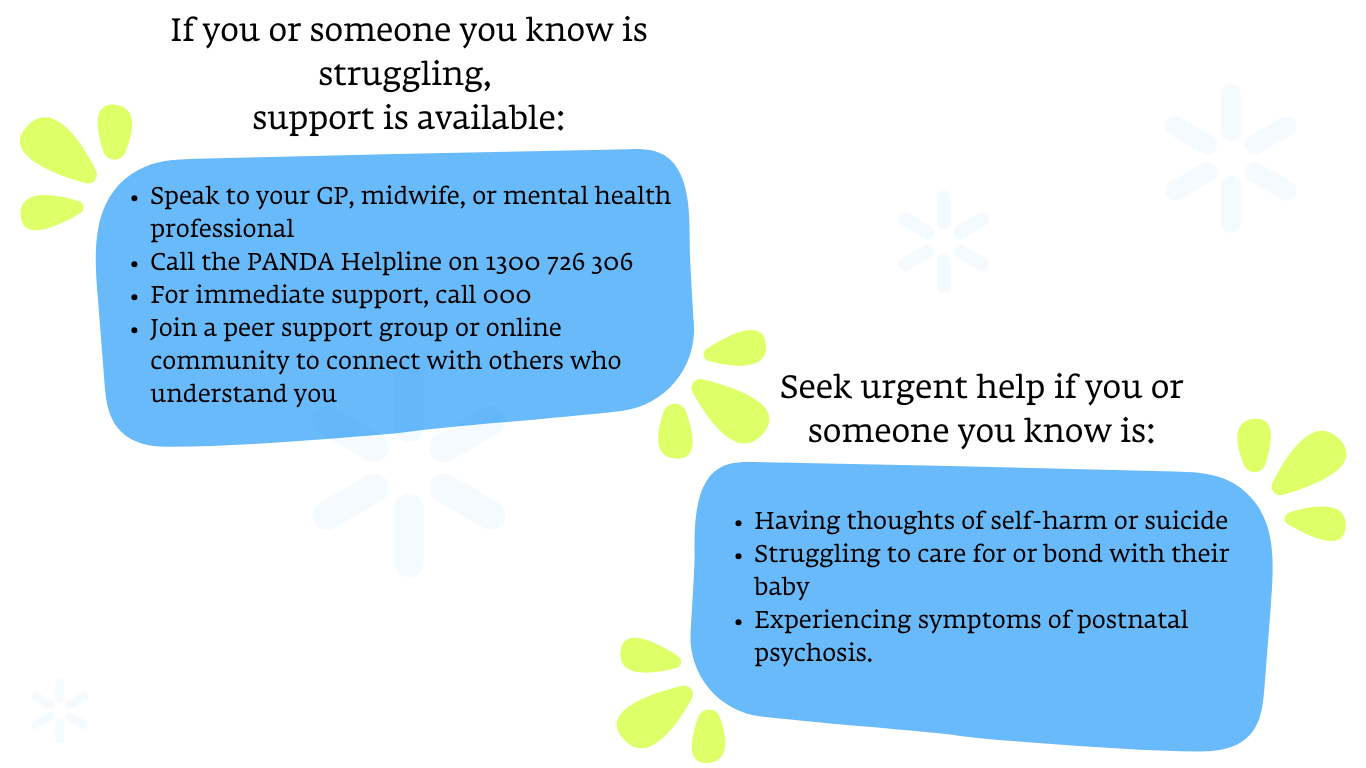Overview
The perinatal period, which encompasses pregnancy and the first year of parenthood, is a time filled with both joy and challenges. It’s natural for expectant and new parents to experience a range of emotions during this time. However, if ongoing feelings of stress, sadness, or anxiety start to impact your daily life, it’s important to recognise that this may signal perinatal mental health issues.
Around 1 in 5 women experience perinatal mental health challenges, and it’s not just mums – 10% of dads experience depression and 20% struggle with anxiety. If you have a history of mental health challenges or are dealing with extra stress, your risk might be higher.
The most common perinatal mental health issues are depression and anxiety, but other conditions like postpartum psychosis, bipolar , borderline personality (BPD), and psychological birth trauma can also arise.
Signs & Symptoms
Perinatal mental health struggles can show up in different ways, from mild to severe. Here are some signs to look out for:
Emotional & psychological symptoms
- Feeling persistently down, hopeless, or overwhelmed (for two months or more)
- Increased irritability or feeling ‘on edge’ all the time
- Struggling with guilt, self-doubt, or feeling like you’re not good enough
- Loss of interest in things you used to enjoy
- Withdrawing from family and friends
- Intense anxiety, panic attacks, or constant worrying
- Negative thoughts about yourself or your parenting
Physical & behavioural symptoms
- Trouble sleeping (even when the baby is sleeping) or sleeping too much
- Changes in appetite—eating too little or too much
- Feeling exhausted or physically run down
- Heart palpitations, breathlessness, or tightness in the chest
- Avoiding social interactions or struggling to bond with your baby
- Thoughts of self-harm, suicide, or feeling like you need to escape
Some parents experience post-traumatic stress disorder after a difficult pregnancy or birth. Signs include:
- Flashbacks, nightmares or distressing memories about the birth
- Avoiding anything that reminds you of the trauma
- Feeling disconnected from others
- Feeling hypervigilant
Postnatal psychosis is a rare but serious condition that needs immediate medical attention. Symptoms include:
- Delusions or hallucinations (seeing or believing things that aren’t real)
- Confusion or struggling to think clearly
- Rapid mood swings, from feeling euphoric to deeply depressed
- Risk of harm to self or the baby.
What causes Perinatal Mental Health Issues?
Hormonal changes during pregnancy and after birth: shifts in hormone levels can impact mood
Lack of sleep and physical exhaustion.
Personal or family history of mental health conditions.
Past trauma, including difficult childbirth experiences.
Lack of support from family, friends or a partner.
There’s no single cause, but several factors can play a role.
It is also important to note that early support can make a huge difference, so routine mental health check-ups during pregnancy and postpartum are encouraged.
Treatment options
Help is available, and most people recover with the right support. Options include:
Professional support
A GP, psychologist, psychiatrist, or midwife can help.
Therapy & counselling
Cognitive Behavioural Therapy (CBT) and other evidence-based approaches can be effective.
Medication
Certain medications that are safe during pregnancy and breastfeeding can help.
Hospital care
In severe cases, inpatient care or mother-baby units may be needed.
Help & support

Resources & further reading

View a range of factsheets and resources available for health professionals, community groups and culturally and linguistically diverse communities.

Find a number of fact sheets for women and their families on topics such as postnatal anxiety, postnatal depression, postpartum psychosis, psychological birth trauma, and more.
